Cannabis has become a topic of intense global interest, especially with increasing cannabis legalization across many countries. One of the most researched areas is the impact of THC, the psychoactive compound in the cannabis plant, on memory retention. Whether you’re curious about how THC and memory interact or worried about the effects of cannabis use on cognitive health, this article unpacks what the latest research says.
Does THC Really Affect Your Memory?
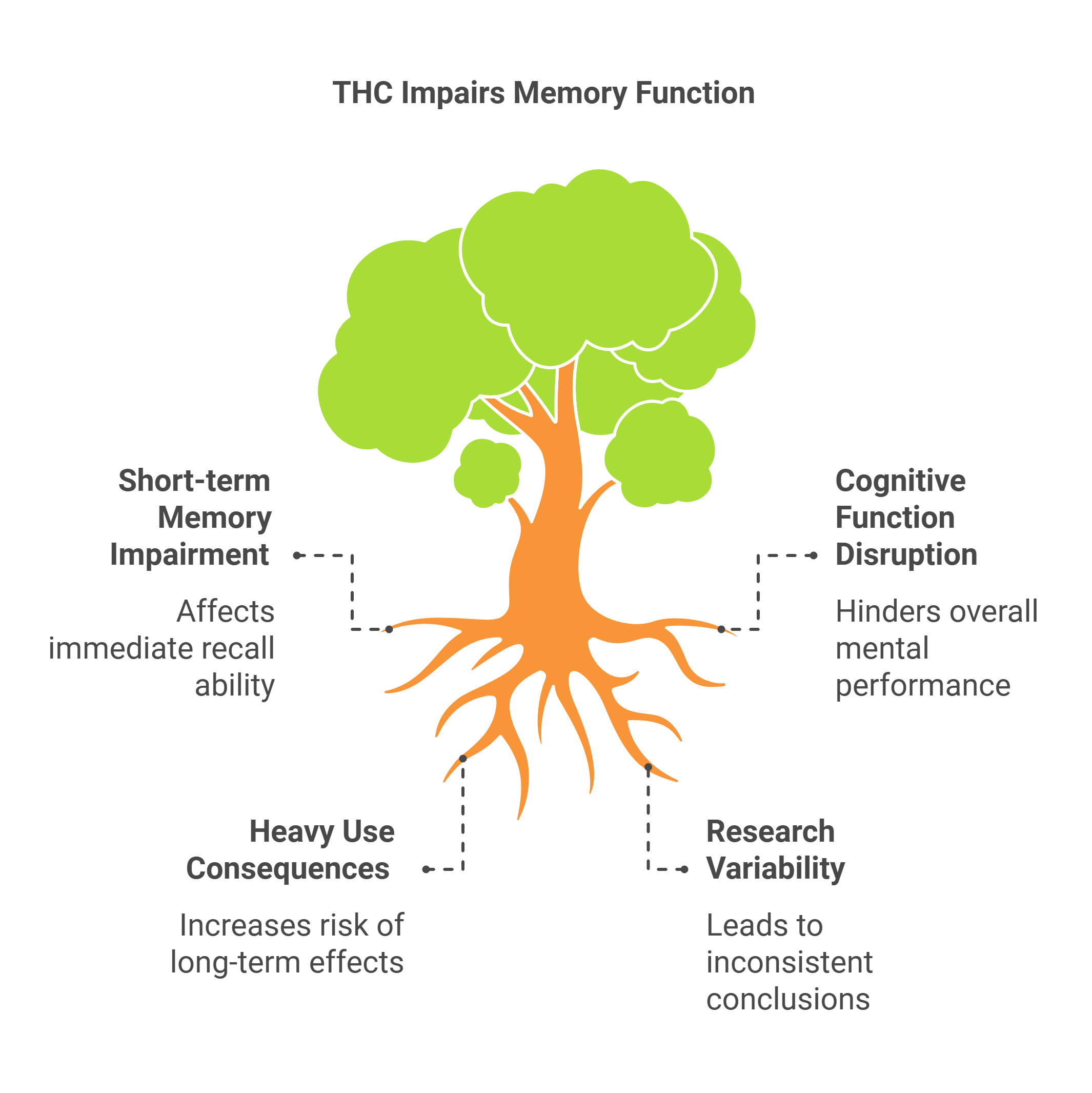
It indeed affects memory, but to what extent and in what form will depend on a multitude of factors, including the age of the individual, the rate of cannabis use, and the strength of the products consumed.
What Does THC Do to Your Brain?
As you smoke or consume cannabis, the THC works along the cerebral cortex and the hippocampus, among other essential areas in your brain with memory and learning responsibilities. Cannabis flower, including other forms of cannabis, binds to cannabinoid receptors, causing disruption of normal activity.
Critical effects of THC on the brain include:
- Acute cannabis use impairs working memory, which is crucial in short-term problem-solving and decision-making.
- Episodic memory is disrupted, making episodic experience retrieval more difficult.
- This leads to unreliable recognition memory, whereby false memories easily occur.
Are Certain Groups More Affected by THC’s Effects on Memory?
There is evidence from research that states that THC-induced effects tend to be dangerous for young adults, who also have developing brains. Around young adulthood, a critical shift also occurs in the functioning of memory and executive function, which are negatively altered in most cases through marijuana use.
But let's consider moving on to science and what studies found.
What Do Studies Say About THC and Memory Retention?
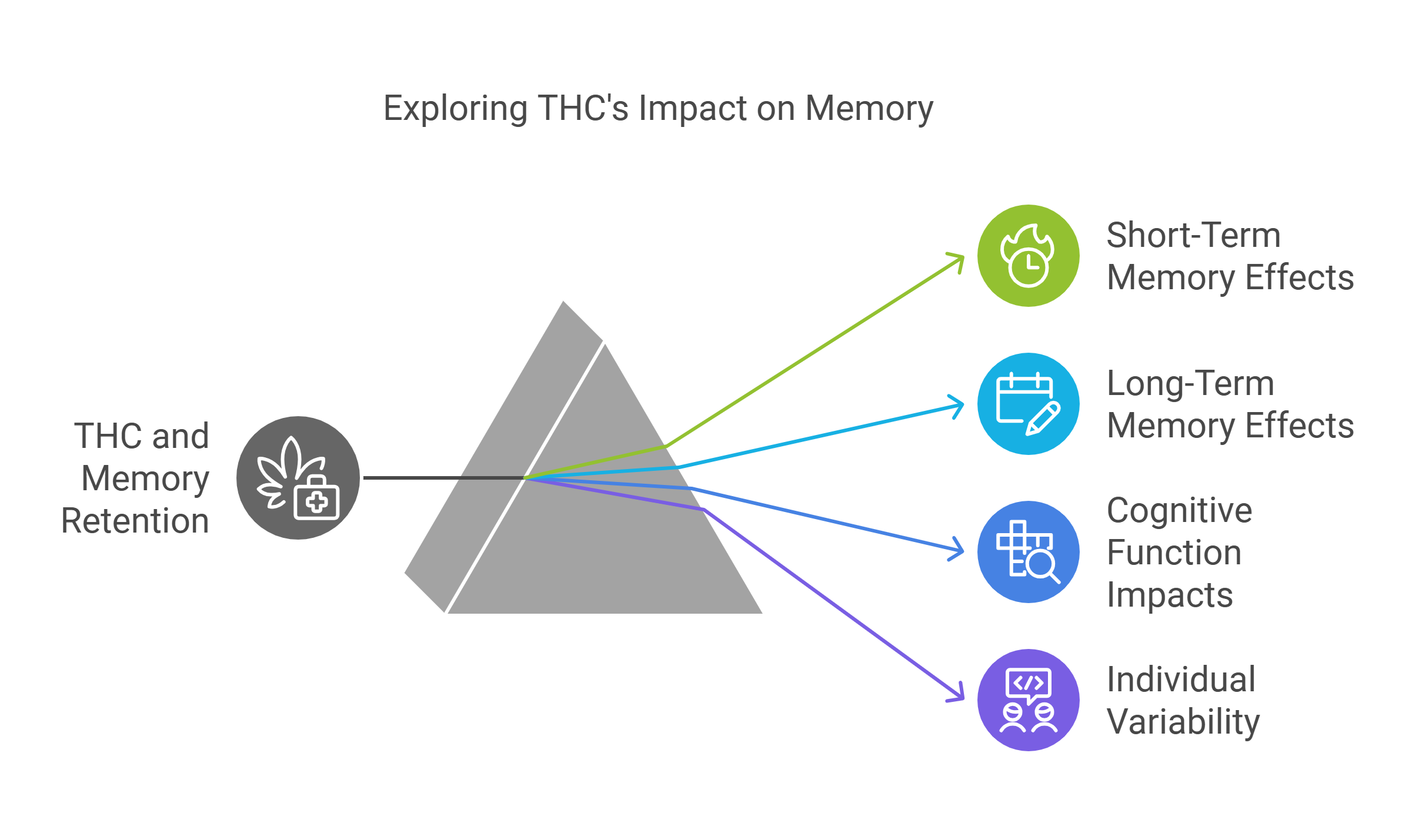
Scientific studies have been extremely informative of the relationship of cannabis consumption to memory, yet common results are often conflicting due to study design or population and whether it is acute effects versus long-term consequences.
What Have Research Studies Found?
- Harvard Medical School reports that cannabis users often experience reduced ability in verbal memory tasks, especially those requiring verbal learning and recall.
- A study developed by the National Institute of Health reveals that cognitive deficits are very closely linked to cannabis use disorder, more so in frequent users.
- In one systematic review, researchers emphasized that acute administration of THC may blunt certain aspects of cognition involving attention and concentration.
Are Medical Marijuana Users Less Affected?
Although users who use medical marijuana have fewer memory problems than recreational drug users do, because they have medication administered at controlled doses, medical purposes for cannabis still hold some danger to impaired cognition, especially in the long run.
On a bigger scale, let's see how cannabis compares with others.
How Does Cannabis Compare to Other Drugs?
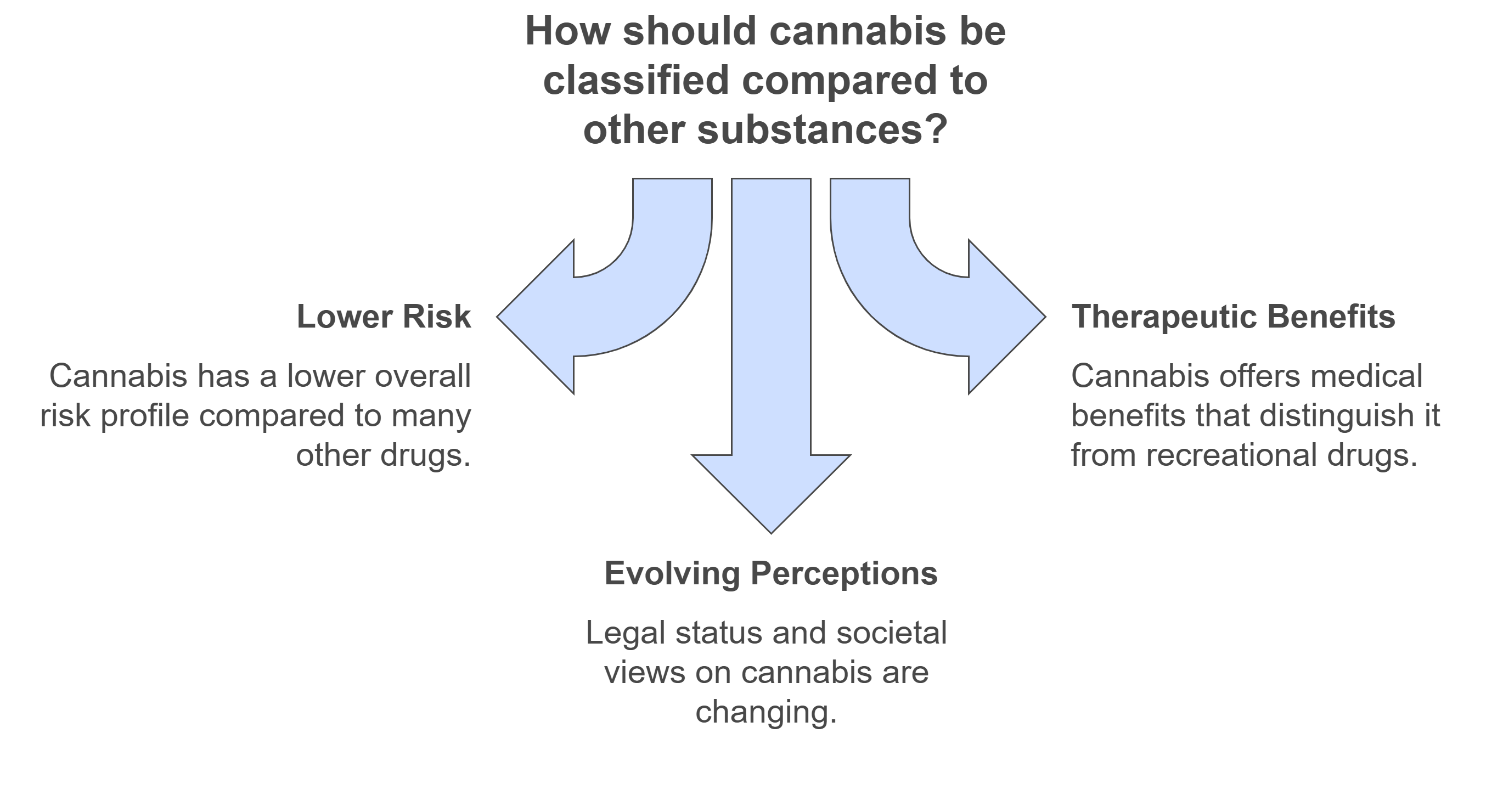
Besides cannabis, there are other factors, including alcohol and tobacco, which directly influence cognitive functions, thus creating threats to brain development and memory. A comparison will help in establishing relative risks for cannabis's effects.
Cannabis vs. Alcohol
Sometimes, alcohol is believed to affect memory more significantly than cannabis. Let's break it down:
|
Substance |
Short-Term Memory Impact |
Long-Term Memory Impact |
Overall Health Risks |
|
Cannabis |
Impairing working memory and recognition memory |
Persistent cognitive deficits with chronic use |
Influences brain regions like the hippocampus |
|
Alcohol |
Causes blackouts, creating false memory issues |
Severe cognitive impairment with dependency |
Impacts both brain function and physical health |
Cannabis and Tobacco: A Risky Combination
Adding tobacco to the cannabis increases the risks of cognitive problems. Tobacco does not have a direct effect on memory, but it will exaggerate the negative effects that cannabis has on memory performance and overall brain function.
Moving on to the risks of long-term usage, let's discuss chronic cannabis consumption.
Is Chronic Cannabis Use Risky for Your Memory?
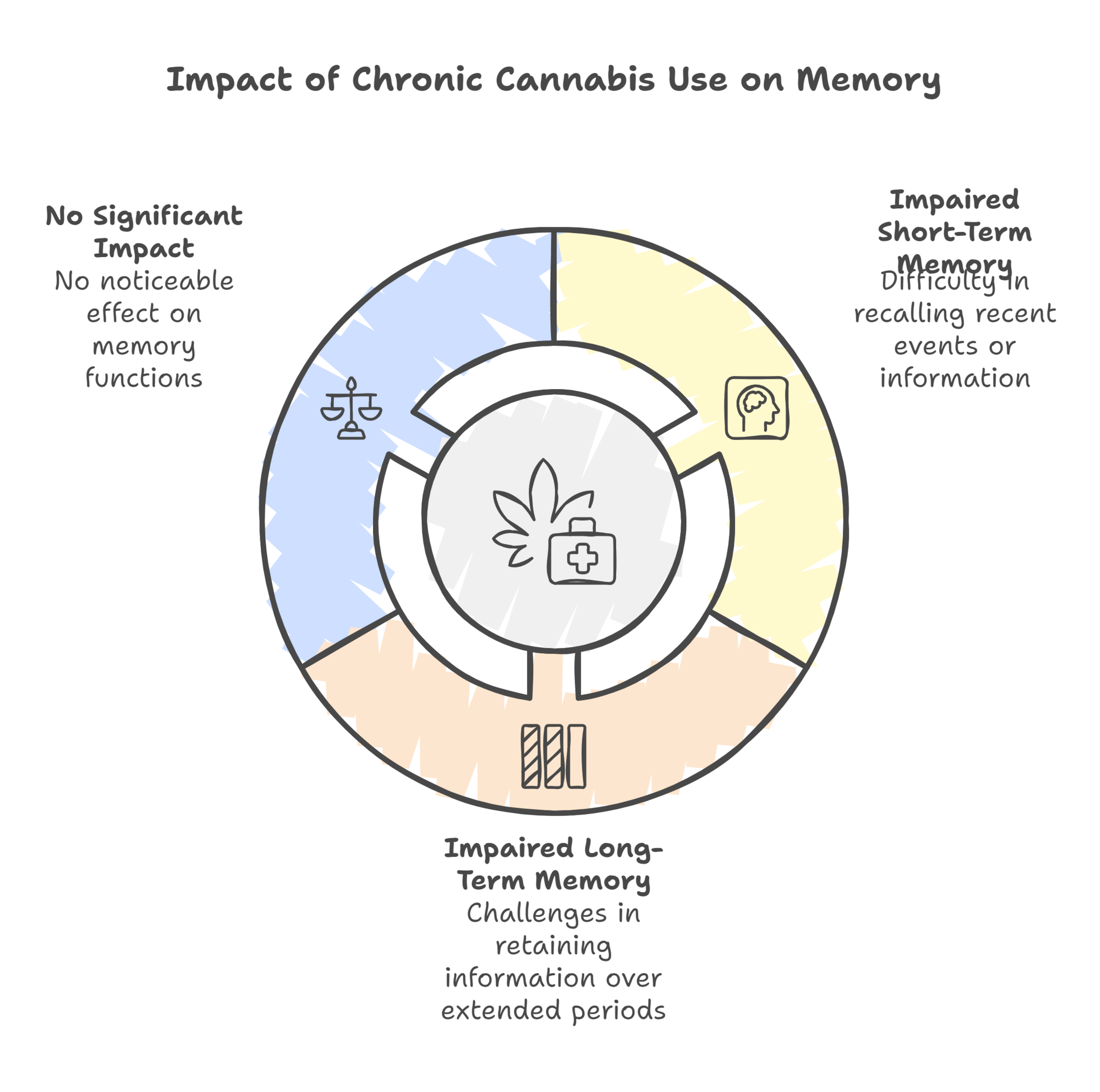
Chronic exposure to heavy use of marijuana may result in lasting damage to memory. It is particularly problematic when use begins during adolescence or young adulthood.
Long-Term Effects of Cannabis Use
It has been associated with long-term risks of
- Structural changes within the cerebral cortex and regions of the brain associated with memory.
- Reduced processing speed along with problems with verbal learning.
- Persistent cognitive deficits even after stopping cannabis use.
Can Chronic Use Lead to Cannabis Use Disorder?
Yes, cannabis use disorder is a condition that may arise from heavy usage where people cannot quit taking the substance despite the fact that it negatively affects their lives. The condition typically worsens memory problems and other cognitive effects.
What Role Does Research Play in Understanding THC and Memory?
Ongoing studies are important in establishing what the full extent of THC exposure is to memory. Although a lot of research has been done on this, scientists agree that more research is needed to understand what THC does to other factors of the cannabis plant and different populations.
Current Gaps in Research
- Most studies focus on the acute effects but lack discussion on the cumulative effects of long-term exposure to cannabis.
- There is less research into the interaction between THC and other cannabinoids in cannabis products.
- At present, it remains speculative whether balanced THC intake can minimize cognitive impairments.
Why Further Research Is Crucial
The legalization of the culture of cannabis today gives paramount importance to public health effects, which scientists can differentiate between medical marijuana benefits and the risks associated with recreational marijuana through research.
How Can You Reduce the Risks of Cannabis Use on Memory?
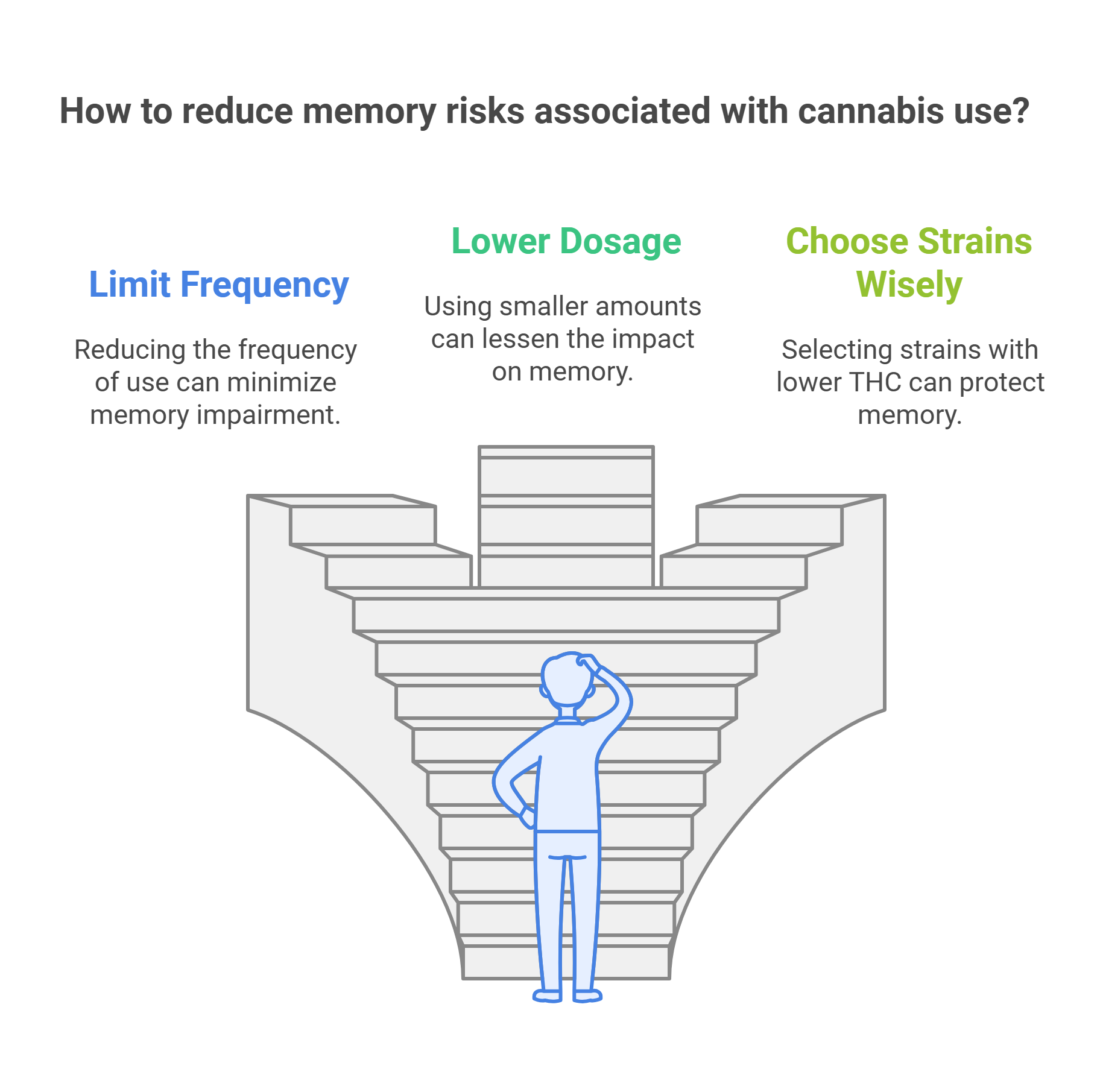
If you take cannabis, there are things you can do to minimize its impact on cognitive functioning and memory function.
Practical Ideas on Risk Reduction
- Limit use during critical periods of brain development; examples: adolescence or young adulthood.
- Prefer medical marijuana above high-THC recreational cannabis to avoid excessive administration of THC.
- Avoid using cannabis with other agents like alcohol and tobacco, which are known to increase additive risks.
Understanding THC and Memory: Effects on Recall and Cognitive Function
The association of THC is complex and constantly evolving with regard to memory. Clearly, the implications of cannabis on the cognitive processes are established. However, its extent does vary according to age and frequency of consumption and sometimes the purpose behind consumption as well. Whether it be for medical reasons or just for other purposes, the need to know about the associated risks is required for the appropriate decision. More research will be able to allow us to have the full benefits of marijuana while reducing the side effects.


